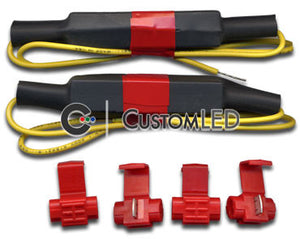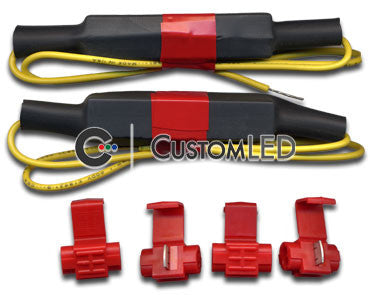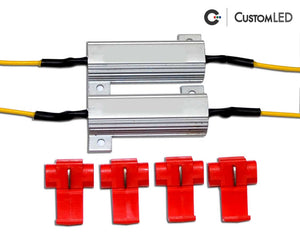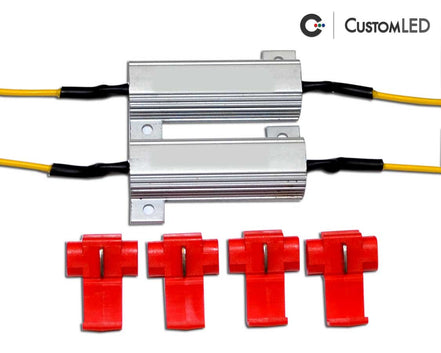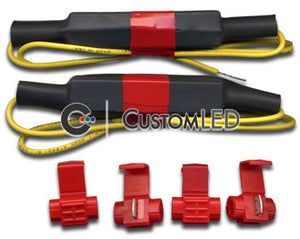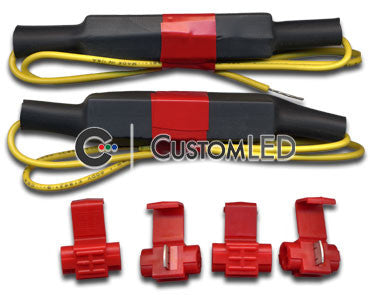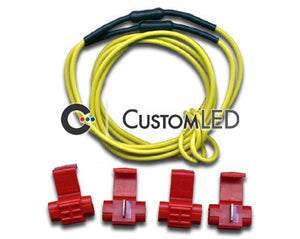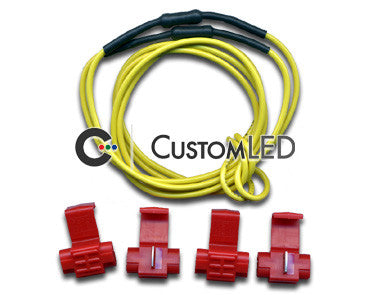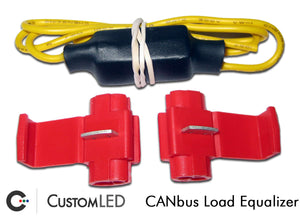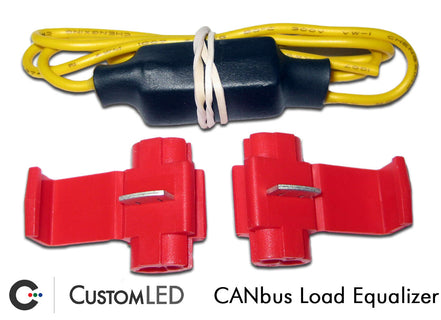Universal LED Load Equalizers - Items tagged as "Load equalizer"
The Custom LED Universal Load Equalizers come in a few sizes, and fix the common problems associated with retrofitting incandescent turn signal bulbs to LEDs.
Blinker Problems: There are a few problems that can arise if one replaces incandescent bulbs with LEDs (or smaller bulbs) on a automobile or motorcycle turn signal system.
- Fast Blink Problem: The turn signal blinkers blink faster than stock. This is the designed response of the OEM flasher relay, so that it can alert the operator to a lamp failure.
- No Blink Problem: The turn signal blinkers do not blink. They either come on and stay on, or do not come on at all. This is a failure mode of the OEM flasher relay.
- 4-Way Blink Problem: The turn signals come on on both the left and right side at the same time, regardless of which direction you choose. This is a wiring anomaly generally occurring at the gauge cluster. Read more about the 4-Way Blink Problem in our Blog.
Solutions:
- Blink speed issues (Fast Blink or No Blink) are best handled by replacing the flasher relay with one of our Electronic LED Flasher Relays. Our Electronic LED Flasher Relays are designed to blink at the proper speed, regardless of blinker lamps used (LED or incandescent or both). If you can not replace your flasher relay with one of our Electronic LED Flasher Relays, then you need to use our Load Equalizers.
- The 4-way blink problem is slightly more complicated. This problem actually has nothing to do with the flasher relay itself. Replacing your flasher relay will not and can not fix this problem. The simple solution to the 4-way blink problem is to add Load Equalizers, but read our blog page for more details on the 4-way blink problem.
The correct way to use Load Equalizers is to match the Wattage of the OEM turn signal bulb with our Load Equalizers - so that you are replacing the wattage that is missing after you modify your turn signals.
Sometimes the right solution for your motorcycle is a combination of our Electronic LED Flasher Relay, and a Load Equalizer. Please don't hesitate to contact us if you have questions about your particular setup. You can also read more about Load Equalizers in our Blog.
-
 QUICK VIEW
Load Equalizer - 25 Watt (pair)
QUICK VIEW
Load Equalizer - 25 Watt (pair)
£22.00£18.00 GBP SALE SALE
SALE
Load Equalizer - 25 Watt (pair)
£18.00 GBP£22.00Provides the same electrical load as a 20 to 30 Watt incandescent bulb. Fixes the fast-blink, no-blink and 4-way blink problems. Comes with non destructive quick-tap connectors. Comes with detailed installation instructions. Superior...» View full product details -
 QUICK VIEW
Load Equalizer - 25 Watt Heavy Duty (pair)
QUICK VIEW
Load Equalizer - 25 Watt Heavy Duty (pair)
£27.00£21.00 GBP SALE SALE
SALE
Load Equalizer - 25 Watt Heavy Duty (pair)
£21.00 GBP£27.00Provides the same electrical load as a 20 to 30 Watt incandescent bulb. Designed to operate on systems that share turn signal and brake circuits in one (automobiles and some late model motorcycles)....» View full product details -
 QUICK VIEW
Load Equalizer - 10 Watt (pair)
QUICK VIEW
Load Equalizer - 10 Watt (pair)
£22.00£18.00 GBP SALE SALE
SALE
Load Equalizer - 10 Watt (pair)
£18.00 GBP£22.00Provides the same electrical load as a 7 to 13 Watt incandescent bulb, which are commonly used on late-model motorcycles. Fixes the fast-blink, no-blink and 4-way blink problems. Comes with non destructive...» View full product details -
 QUICK VIEW
Load Equalizer - 2 Watt (pair)
QUICK VIEW
Load Equalizer - 2 Watt (pair)
£15.00£12.00 GBP SALE SALE
SALE
Load Equalizer - 2 Watt (pair)
£12.00 GBP£15.00Fixes the no-blink and 4-way blink problems for many blinker systems (Note: some systems require more than one pair, or larger Load Equalizers.) Fixes the fast-blink, no-blink and 4-way blink...» View full product details -
 QUICK VIEW
CANbus Load Equalizer
QUICK VIEW
CANbus Load Equalizer
£8.00£6.00 GBP SALE SALE
SALE
CANbus Load Equalizer
£6.00 GBP£8.00Restores Cruise Control Function when modifying the OEM tail light on most motorcycles. Adds CANbus compatibility on most motorcycles equipped with a CANbus system. Superior "Oversized" design prevents excessive heat...» View full product details
About our Universal LED Load Equalizers
The Custom LED Universal Load Equalizers come in a few sizes, and fix the common problems associated with retrofitting incandescent turn signal bulbs to LEDs.
Blinker Problems: There are a few problems that can arise if one replaces incandescent bulbs with LEDs (or smaller bulbs) on a automobile or motorcycle turn signal system.
- Fast Blink Problem: The turn signal blinkers blink faster than stock. This is the designed response of the OEM flasher relay, so that it can alert the operator to a lamp failure.
- No Blink Problem: The turn signal blinkers do not blink. They either come on and stay on, or do not come on at all. This is a failure mode of the OEM flasher relay.
- 4-Way Blink Problem: The turn signals come on on both the left and right side at the same time, regardless of which direction you choose. This is a wiring anomaly generally occurring at the gauge cluster. Read more about the 4-Way Blink Problem in our Blog.
Solutions:
- Blink speed issues (Fast Blink or No Blink) are best handled by replacing the flasher relay with one of our Electronic LED Flasher Relays. Our Electronic LED Flasher Relays are designed to blink at the proper speed, regardless of blinker lamps used (LED or incandescent or both). If you can not replace your flasher relay with one of our Electronic LED Flasher Relays, then you need to use our Load Equalizers.
- The 4-way blink problem is slightly more complicated. This problem actually has nothing to do with the flasher relay itself. Replacing your flasher relay will not and can not fix this problem. The simple solution to the 4-way blink problem is to add Load Equalizers, but read our blog page for more details on the 4-way blink problem.
The correct way to use Load Equalizers is to match the Wattage of the OEM turn signal bulb with our Load Equalizers - so that you are replacing the wattage that is missing after you modify your turn signals.
Sometimes the right solution for your motorcycle is a combination of our Electronic LED Flasher Relay, and a Load Equalizer. Please don't hesitate to contact us if you have questions about your particular setup. You can also read more about Load Equalizers in our Blog.

